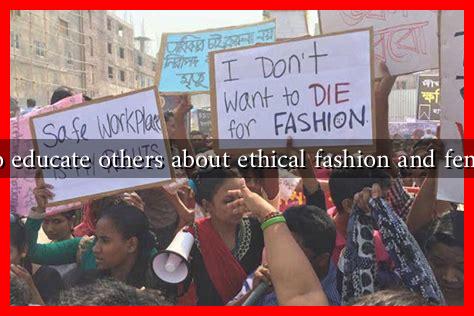-
Table of Contents
How to Educate Others About Ethical Fashion and Feminism
In recent years, the intersection of ethical fashion and feminism has gained significant attention. As consumers become more aware of the social and environmental impacts of their purchasing decisions, the need for education on these topics has never been more critical. This article explores effective strategies for educating others about ethical fashion and feminism, providing insights, examples, and actionable steps.
Understanding Ethical Fashion and Feminism
Before diving into educational strategies, it’s essential to define what ethical fashion and feminism entail:
- Ethical Fashion: This refers to clothing and accessories produced in a way that is environmentally sustainable and socially responsible. It encompasses fair labor practices, eco-friendly materials, and transparency in the supply chain.
- Feminism: A movement advocating for women’s rights and equality across various spheres, including economic, political, and social domains. Feminism in fashion emphasizes the empowerment of women in the industry and challenges gender stereotypes.
Strategies for Educating Others
Educating others about ethical fashion and feminism requires a multifaceted approach. Here are some effective strategies:
1. Leverage Social Media
Social media platforms are powerful tools for spreading awareness. Use them to share informative content, such as:
- Infographics that illustrate the impact of fast fashion on the environment.
- Videos featuring interviews with ethical fashion designers or activists.
- Posts highlighting brands that prioritize ethical practices and feminist values.
For example, Instagram accounts like @feministfashion and @ethicalfashionforum provide valuable insights and resources that can inspire followers to make informed choices.
2. Host Workshops and Events
Organizing workshops or community events can create a space for discussion and learning. Consider the following:
- Invite speakers from the ethical fashion industry to share their experiences.
- Conduct hands-on workshops on upcycling clothing or creating sustainable fashion pieces.
- Facilitate discussions on the role of feminism in fashion and how it can drive change.
Case studies, such as the “Fashion Revolution Week,” demonstrate how collective action can raise awareness about ethical practices in the fashion industry.
3. Create Educational Content
Developing educational materials can help disseminate information effectively. Consider creating:
- Blog posts that explore the history of ethical fashion and its connection to feminism.
- Podcasts featuring discussions with industry experts and activists.
- Newsletters that provide updates on ethical brands and initiatives.
For instance, the website Fashion Revolution offers a wealth of resources, including guides and reports that can be shared with others.
4. Collaborate with Local Businesses
Partnering with local businesses can amplify your message. Consider:
- Collaborating with ethical fashion boutiques to host pop-up events.
- Encouraging local cafes or community centers to display educational materials.
- Creating a local network of ethical brands that support feminist initiatives.
Such collaborations can foster a sense of community and encourage more people to engage with ethical fashion and feminism.
Measuring Impact and Engagement
To ensure your educational efforts are effective, it’s crucial to measure their impact. Consider the following methods:
- Conduct surveys before and after workshops to assess knowledge gained.
- Track social media engagement metrics, such as likes, shares, and comments.
- Monitor attendance at events and gather feedback for improvement.
Conclusion
Educating others about ethical fashion and feminism is a vital step toward creating a more sustainable and equitable world. By leveraging social media, hosting workshops, creating educational content, and collaborating with local businesses, we can inspire change and empower individuals to make informed choices. As we continue to raise awareness, we contribute to a movement that not only champions ethical practices but also uplifts women in the fashion industry. Together, we can foster a culture of responsibility and equality, ensuring that fashion serves as a platform for positive change.

